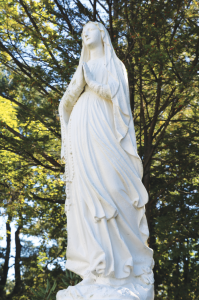
For most of us when we think about Mary, meditate on her and contemplate her glorious, majestic and all-inspiring person, we probably see her in the posture of prayer. This is more than logical, correct and worthy of praise and promotion! Nonetheless, it is also true that Mary had a very active life. This is easy for us to forget.
MARY OF NAZARETH. In Nazareth we could call Mary the perfect “Contemplative in action”. This means in concrete terms that Mary was a
woman of the most profound prayer life—she was constantly in deep union with the Father, Son and Holy Spirit. Still, in the family life of Nazareth Mary was very active. For this reason, Mary can be the model for so many people, but especially workers and most especially home-makers.
woman of the most profound prayer life—she was constantly in deep union with the Father, Son and Holy Spirit. Still, in the family life of Nazareth Mary was very active. For this reason, Mary can be the model for so many people, but especially workers and most especially home-makers.
The fruit of Mary’s prayer life, her deep contemplative union with God, was poured out like a libation in service to the two persons that she loved most on earth—her husband and Son, Saint Joseph and Jesus. Likewise our prayer life should over-flow and spill over into our active life of service, especially to those who are closest to us—our family members! Remember: charity begins at
home!
home!
Now, in this short contemplation, let us try to imagine what might be a typical day in the life of Mary of Nazareth. Imagine it and how do you think it was like? Saint Ignatius of Loyola in the Spiritual Exercises encourages us to contemplate the life of Jesus, Mary and Joseph in the family life of Nazareth. Let’s try it!
MARY’S FIRST FRUITS. I cannot imagine Mary “sleeping in” ever, can you? Very early in the morning I imagine Mary, upon waking, immediately
giving her first-fruits to God by praising Him and thanking Him for another day of existence. So should we start our days!
giving her first-fruits to God by praising Him and thanking Him for another day of existence. So should we start our days!
FAMILY WORK. Possibly afterward, try to imagine Mary preparing a frugal breakfast for these hard-laborers that we call “Carpenters”. Mary was always thinking of how to please God in serving others—what an example for all of us!
WATER. We take so many things for granted and one of these is the availability of running water or if you like bottled spring water. Not so in the time of Mary! Running, faucet water did not exist. Rather, the acquisition of water was a real chore, hard work, to say the least. WELLS! Women had to travel on foot to wells with a jug that they would carry and often on their heads. No air-conditioned cars and easy service! Upon arriving at the well, most likely there were other women there for the same purpose—to draw water for the needs of their families. This meant that Mary
most likely had to wait on line and she did it with the greatest patience. Are you patient when you have to wait? Then after drawing the water from the well, Mary had to carry it home, most likely with the jug on her head!
most likely had to wait on line and she did it with the greatest patience. Are you patient when you have to wait? Then after drawing the water from the well, Mary had to carry it home, most likely with the jug on her head!
CLEAN HOUSE. Her home would obviously be exposed to the entrance of dirt, dust, and debris. Therefore, on a daily basis Mary would carry out the mundane duty of sweeping her home. This was done with joy and no complaints; it was done methodically and orderly and it was done with love because she wanted a clean home to which Joseph and Jesus could return after a hard-days’ work.
WASHING AND DRYING. Back then electricity did not exist and therefore, washing machines and dryers, which facilitate our modern society immensely, these modern luxuries did not even exist and would not exist for centuries into the future. It is easy for us to take for granted what we
have and what they did not have.
have and what they did not have.
COOKING. Eat and run, fast food services, and gourmet Restaurants are all modern realities. Mary had to cook to feed her hungry husband and son after their hard day work in the carpenter shop of Nazareth. Carpentry was a hard and demanding profession and of course demanded energies and calories. With the utmost attention and love, Mary prepared the evening meals for Joseph and Jesus. Everything Mary did was done with love, care, attention and perfection. Of course Mary always had the most noble of intentions—love for God in the humble service of her neighbor, even more important, her husband and Son. How easy it is for the modern mother, wife, and home-maker to become bored, jaded, and even angry at times over the simple fact that she has to prepare the dinner meal for her family! If only these home-makers could contemplate the example of Mary and the great love that she had in her daily chores—cooking included—then their lives would be much more enthusiastic, energized and life-giving! May our Lady help us!
WASHING AND CLEANING. I cannot imagine Mary insisting on Saint Joseph and Jesus “doing their part” in having them wash the dishes and utensils after the meal was concluded. On the contrary, Mary cooked the meal, prepared the table, had a warm and loving meal with her husband and Son, but was then the first to lift the table and clean the dishes—all done with gratitude for God’s gifts, with love and with overflowing joy and simplicity. How much we indeed can learn from the family at Nazareth and the shining example of the Blessed Virgin Mary, the “Contemplative in action.” Indeed Mary had a deep contemplative prayer life and union with God. Still, Mary put into practice the fruits of her prayer life in loving service to her beloved husband and Son, Jesus the Son of Mary and of the carpenter.
CLOSING SUGGESTION. Why not start today to upgrade your own domestic life and chores? Why not do a meditation on a typical day of Mary, the house-wife, home-maker, wife and mother at Nazareth. Then, starting now, offer your work to Jesus, Mary and Joseph as a gift of love. Finally, as you go about your daily chores, why not ask Our Lady of Nazareth to be with you, to accompany you in your daily chores, in every little action. Holiness does not depend so much on the greatness of the action, but in the love that accompanies every little action. Holiness, in imitation of Mary of Nazareth, depends on doing the ordinary things of daily life with extraordinary love. Our Lady of Nazareth pray for us and inspire us to be truly “Contemplatives in action.”
